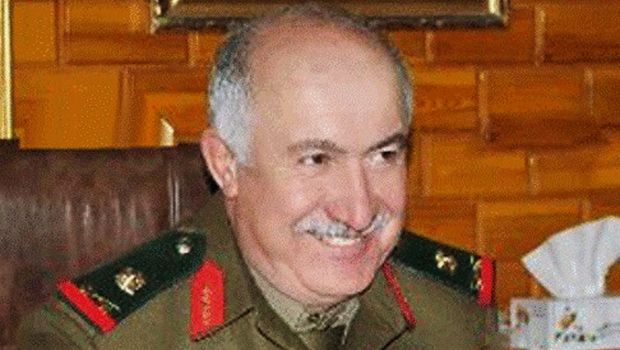
In this undated photo released on late Thursday, Oct. 17, 2013, by the Syrian official news agency SANA, Maj. Gen. Jameh Jameh is seen. (AP Photo/SANA)
Beirut, Asharq Al-Awsat—A senior Syrian government military intelligence officer Brig. Jameh Jameh was reportedly shot dead on Thursday by Islamist rebels in eastern Syria, Asharq Al-Awsat has learned.
The chief of intelligence in Deir Ezzor and one of Syria’s top commanders, Jameh was killed after being shot in the head, the pro-Assad Lebanese Al-Mayadeen TV reported.
Speaking exclusively to Asharq Al-Awsat head of the Free Syrian Army (FSA) military council in Deir Ezzor Lt. Muhannad Al-Talla’a said: “FSA battalions yesterday [Thursday] targeted all of Deir Ezzor’s [regime] command headquarters which usually house senior officers and officials particularly the airport and Brigade 137 headquarters.”
The UK-based Syrian Observatory for Human Rights (SOHR) announced on Thursday that Jameh was killed in clashes between the Syrian regime army and several Jihadist groups, including the Al-Qaeda-linked Al-Nusra Front, in the city’s Rushdiya district.
Brig. Jameh was the chief of Syrian military intelligence in Lebanon in 2005 when the former Lebanese Prime Minister Rafik Al-Hariri was assassinated.
Jameh had been linked to the car-bomb assassination and investigated by the UN Special Tribunal for Lebanon tasked with investigating the assassination.
In another development, during a press conference in Moscow Syrian Deputy Prime Minister Qadri Jamil announced that the Geneva II talks will be held on November 23 and 24.
Jamil said that Geneva II is necessary because “everyone is at a dead end—a military and political dead end.
“Geneva is a way out for everyone: the Americans, Russia, the Syrian regime and the opposition. Whoever realizes this first will benefit. Whoever does not realize it will find himself overboard, outside the political process,” Jamil added.
Russian Foreign Ministry spokesman Alexander Lukashevich said: “We shouldn’t get ahead of ourselves. It is not a matter for Syrian officials but the responsibility of UN Secretary General to announce and set dates agreed with all sides.”
For her part, US State Department spokeswoman Jen Psaki said: “We have discussed potential dates but nothing has been finalized,” adding, “No date is final until it is set and announced by the UN”
Questions continue to surround proposed peace talks between the Bashar Al-Assad regime and the opposition, particularly as the head of the Syrian National Council George Sabra threatened to withdraw from Syrian National Coalition if it decided to go to Geneva.
The Coalition is set to decide whether to participate in the peace talks in a meeting on October 25.
Speaking exclusively to Asharq Al-Awsat Coalition spokesman Luay Al-Safi said: “The date Jamil announced yesterday [Thursday] has already been proposed and discussed, but until now there is not any final decision in this regard.”
“The stance of the Coalition will be announced next week following deliberations at the general council meeting which is set to discuss the issue and put it to a vote,” he said.
Safi did not rule out the possibility that the Coalition’s decision might be different from the Council’s particularly given that there is a “difference in opinion between the Coalition’s members and the Council’s representatives.” The Syrian National Council has 22 representatives out of a total of 115 members of the Syrian National Coalition.
“This matter will be decided by the votes,” Safi said in reference to next-weeks meeting.
Safi added: “There are many questions which have not been answered yet, particularly about the regime’s position on the outcomes of Geneva I. This includes issues pertaining to Assad leaving office and not being a part of any solution in the future, as well as the formation of a transitional government with full powers.”
Safi said: “If the situation remains as is, the Coalition will take a negative position [on attending Geneva II].”
